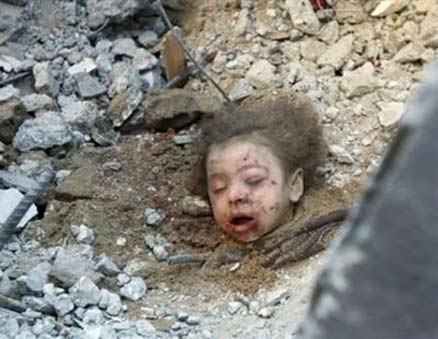Most obvious is the idea of a child as both innocent and as the future. "A little child will lead them." "Suffer the children to come unto me." In the Judeo-Christian sense, children are not only the keys to human survival, but also vessels that need to be filled with wisdom for the virtuous continuation of humanity. Seen this way, to kill a child is to do worse than murder - it's to destroy the promise of the future. Which is certainly what happens in "Buried Child." Once the child is killed, everything starts going downhill. Dodge essentially completes the inevitable destruction of his family when he destroys the child.
That's why killing a child is so horrific. Its life is the future; it hasn't done anything wrong. Culturally, it's pure vicious unconcern for the future of humanity.
I found a song (called, fittingly enough, "My Buried Child") that reminds me so much of this play. And it too taps into that horror at the killing of a child. Here's the URL.
http://www.elyrics.net/read/s/swans-lyrics/my-buried-child-lyrics.html
(This one is a bit tricky. Go to the site. On the right side of the page there's a little audio player with a red "play" arrow. Click on the red play arrow, and it'll take you to another website that will play the song. I couldn't find it on YouTube or Google, otherwise it would be much easier. On the plus side, you get to read the lyrics.)
Same suffocating sense of a crime, impossible to make better. Same horror at their own actions. A child has been killed, and because of what a child means, it's unthinkable that anyone will ever come to terms with it. When the chance for human survival is gone, how can you come to terms with your inescapable extinction?
And no, I'm not going overboard with the adjectives. Here are some pictures that should prove that I'm not. They should also make it really hard to sleep.
Again, here's the warning: GRAPHIC IMAGES AHEAD.
Here they are.


I didn't look for any more. I thought those did the trick.
The helplessness is what gets me. The sheer inability to DO anything, to change their fate. The innocence idea, again. What does a child do to deserve this? How can you hold a child responsible enough to cause their death?
I think that's why the family in "Buried Child" is so shattered. Having caused the child's death, they now have to pay the price for destroying their own survival. It is required of them to self-destruct in punishment. It doesn't mean we can't feel for them - we do, unquestionably - but they can't get around the crime of killing the child. It's possibly the worst crime to commit in our societal mindset. And when it is done, a price must be paid.




